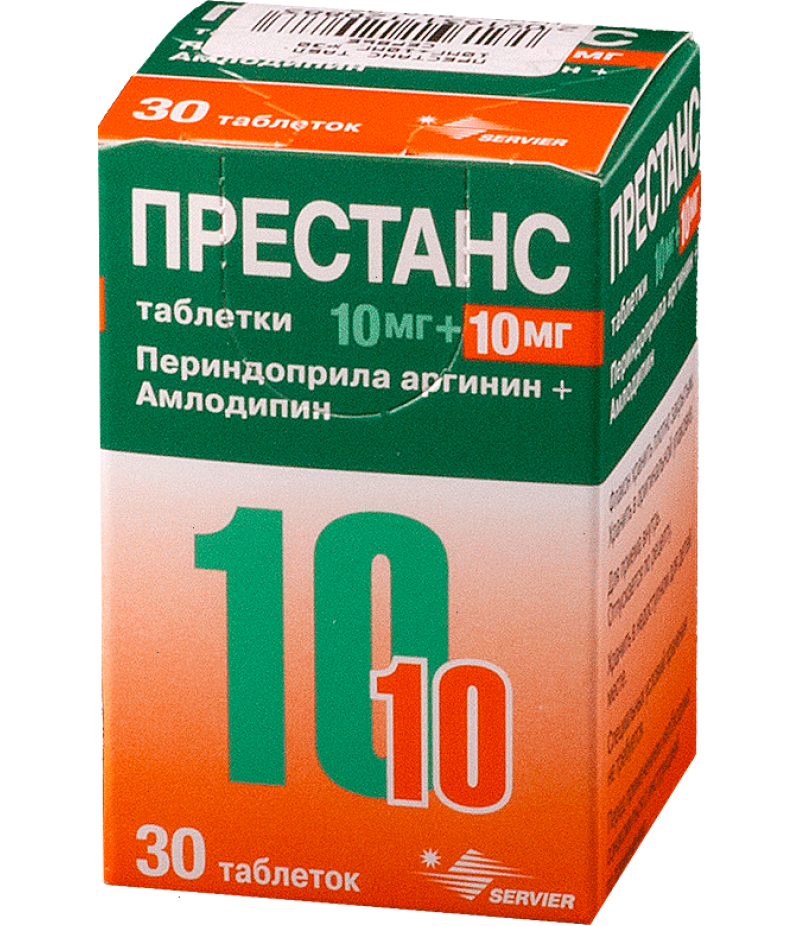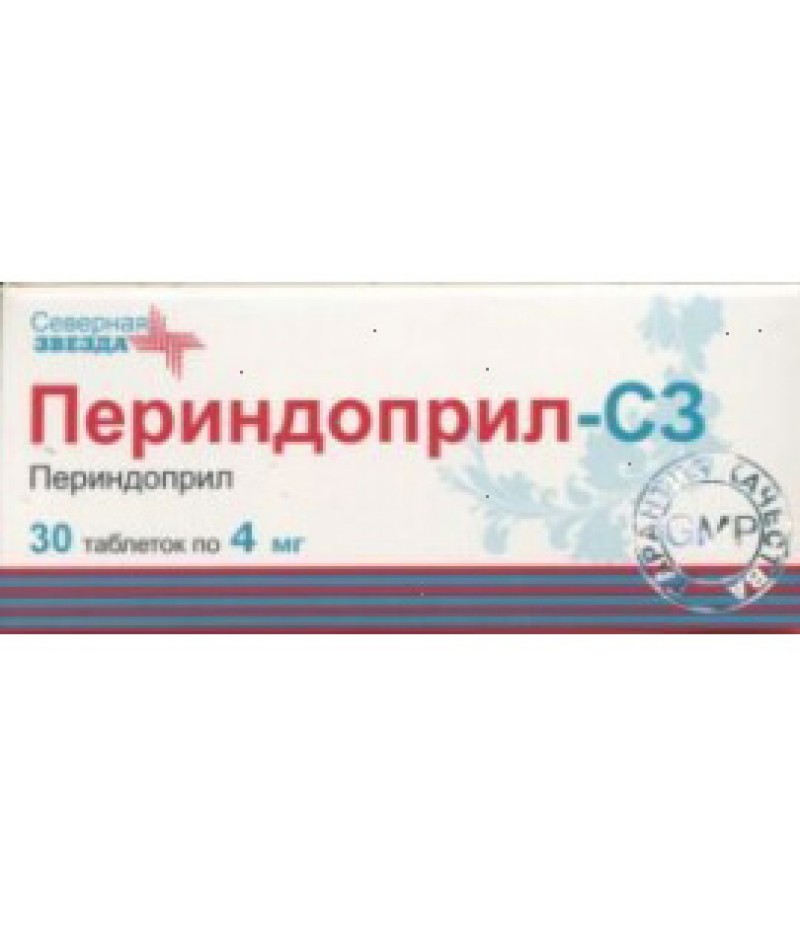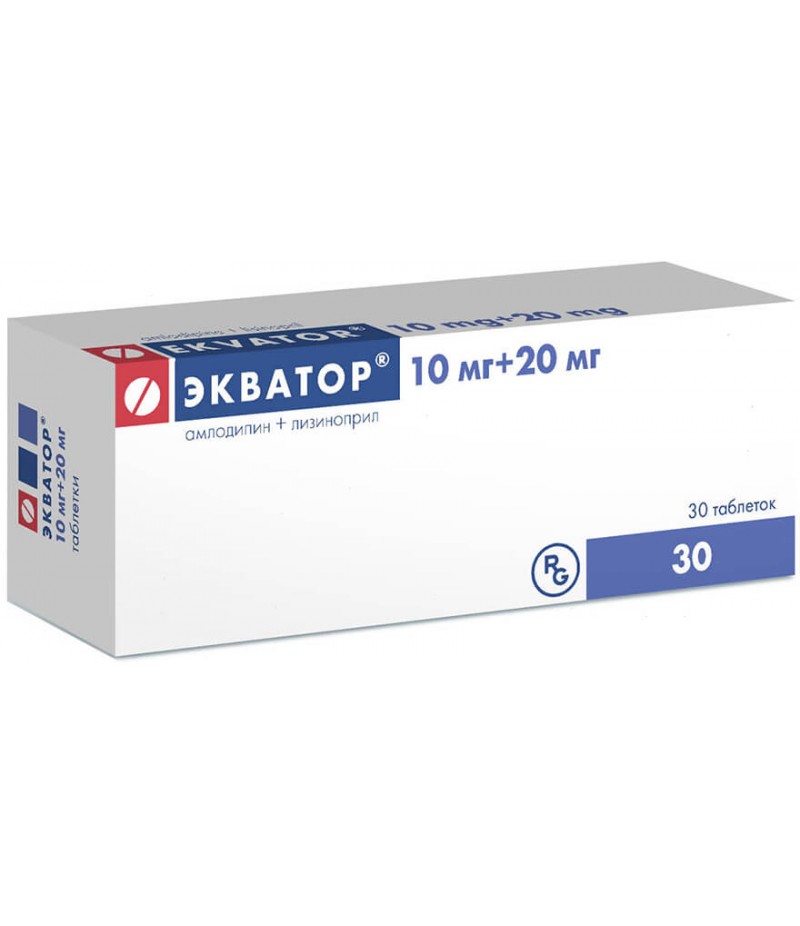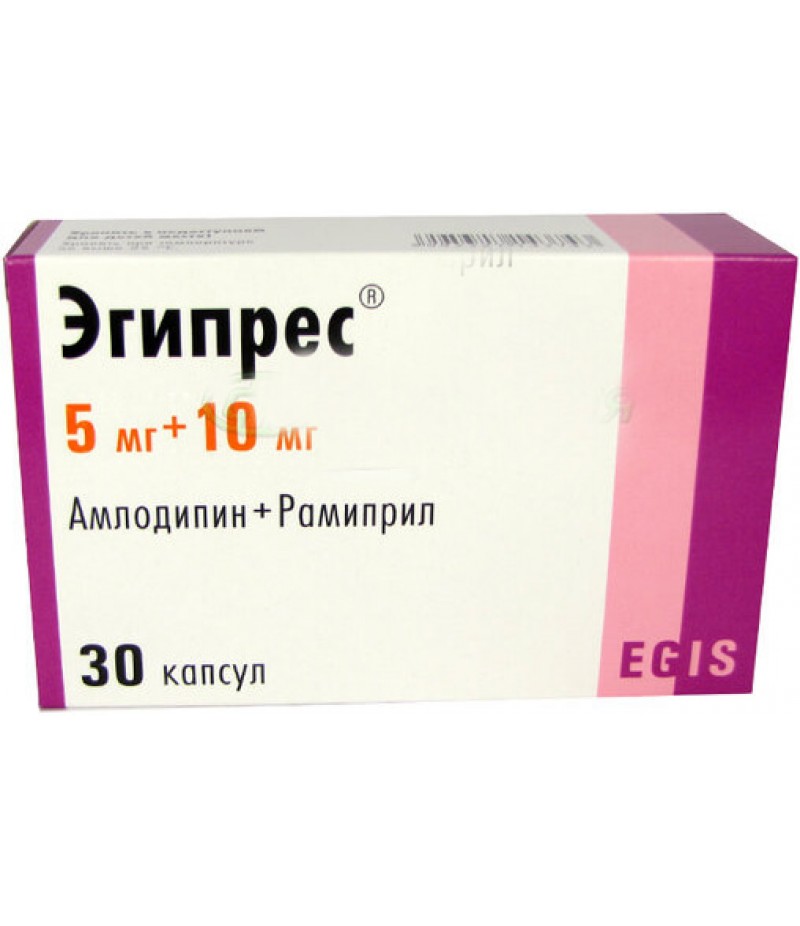Prestance tabs 10mg + 10mg #30
- $38.68
- 3 or more $37.90
- Availability:In Stock
User manual for Prestance tabletsYou can buy Prestance hereIf you want to buy Prestance in different dosage, please contact usCompositionPrestance is available in 4 different versions of the ratio of active ingredients: arginine p..
Tags: tabs
User manual for Prestance tablets
You can buy Prestance here
If you want to buy Prestance in different dosage, please contact us
Composition
Prestance is available in 4 different versions of the ratio of active ingredients: arginine perindopril - 5 mg / 10 mg (which is 3.395 mg / 6.79 mg perindopril), amlodipine besylate-6.935 mg / 13.87 mg (equivalent to 5 mg / 10 mg amlodipine).
Excipients: lactose monohydrate, microcrystalline cellulose, magnesium stearate, colloidal silicon dioxide.
Form of issue
The drug is a biconvex white tablet with an engraving on one edge and a logo on the other. 30 such tablets in a polypropylene vial, one such bottle in a paper packet with autopsy control.
pharmachologic effect
The drug has antihypertensive effect, and also inhibits angiotensin-converting enzyme and calcium channels.
Pharmacodynamics and pharmacokinetics
Pharmacodynamics
Perindopril inhibits the enzyme that transforms angiotensin I into angiotensin II. Kininase II, or angiotensin-converting enzyme, carries out both the transformation of angiotensin I into the vasoconstrictor angiotensin II and the inactivation of bradykinin, which has a vasodilating effect.
Perindopril has a therapeutic effect due to its metabolite - perindoprilat. Other derivatives have no effect. Perindopril is a drug for the treatment of arterial hypertension of any form and severity. It reduces systolic and diastolic blood pressure in a vertical and horizontal position.
The drug lowers the peripheral resistance of blood vessels, which leads to a decrease in increased blood pressure and increased peripheral blood supply without increasing the heart rate.
The effect of the drug becomes maximum after 5-6 hours after administration and persists for 24 hours. Reduction of pressure is achieved quickly. The therapeutic effect occurs after 1 month from the start of therapy. After discontinuation of treatment, withdrawal syndrome does not develop.
Perindopril also helps to increase the elasticity of large vessels, restore the wall structure of smaller arteries and reduce left ventricular hypertrophy.
Amlodipine is a blocker of calcium channels. Suppresses the transmembrane movement of calcium ions in myocardial tissue and smooth muscle cells of the vessels.
It is known that amlodipine:
expands arterioles, reducing peripheral resistance, heart rate at the same time remains at the same level, and the need for myocardium in oxygen decreases;
expands the cardiac arteries and arterioles. In patients with angina in Prinzmetal, coronary blood flow increases in this case.
Amlodipine does not affect the lipid profile and lipid-lowering blood counts. The drug can be used in people with diabetes, asthma and gout.
Pharmacokinetics
When administered orally, perindopril is rapidly adsorbed, the maximum concentration in the blood appears after 1 hour. The half-life of blood is also 1 hour.
Perindopril is not pharmacologically active. 27% of the substance enters the vascular bed in the form of perindoprilata (active metabolite). In addition to perindoprilat, another 5 metabolites are known that are not pharmacologically active. The maximum concentration of perindoprilat in the blood appears 3 hours after administration. Food intake inhibits the transformation into perindoprilat, affecting the bioavailability. Therefore, the drug should be used 1 time per day, before breakfast.
The binding of perindoprilat to blood proteins is approximately 20% and is dose-dependent.
Perindoprilat is excreted from the body through the kidneys. The final half-life is 17 hours, so the equilibrium concentration is reached within four days.
After reception, amlodipine is absorbed from the digestive tract more slowly than perindapril. Eating does not change the bioavailability of this substance. The maximum concentration of amlodipine in the blood comes in 7-11 hours. Bioavailability varies between 64-80%.
About 97% of the circulating amlodipine in the blood is in the blood in a bound state.
The final half-life of amlodipine from the blood is 37-50 hours. This allows you to take the drug once a day. Metabolised in the liver, with 10% of the dose allocated in its original form and 60% is excreted in the urine in the form of metabolites. Not output by dialysis.
Indications for use
Stable angina pectoris in people who need treatment with amlodipine and perindopril.
Arterial hypertension.
Contraindications
Contraindications to the use of perindopril:
angioedema;
an allergy to perindopril or other drugs from the ACE inhibitor group;
age is less than 18 years.
Contraindications to amlodipine:
allergy to amlodipine;
shock, including cardiogenic;
severe arterial hypotension;
obstruction of the left ventricular outflow tract;
heart failure with unstable hemodynamics after myocardial infarction;
age is less than 18 years.
Contraindications to the administration of Prestance:
allergy to any of the components of the drug;
kidney failure;
age is less than 18 years;
lactose intolerance, lactase deficiency and glucose-galactose malabsorption.
Use with caution in: a single kidney, renal artery stenosis, hepatic or renal failure, allopurinol therapy, immunosuppressants, procainamide, systemic connective tissue diseases, cerebrovascular disorders, atherosclerosis, diabetes mellitus, renovascular hypertension, heart failure, simultaneous estramustine, potassium-sparing diuretics, dantrolene, potassium preparations, lithium preparations, hyperkalemia, surgery, elderly age, desensitizing therapy, ao tal or mitral stenosis.
Side effects
On the part of the blood: leukopenia, agranulocytosis, pancytopenia, neutropenia, thrombocytopenia, decrease in hematocrit and hemoglobin.
From the side of metabolism: hyperglycemia, hypoglycemia.
From the side of immunity: allergic reactions.
From the ENT organs: visual impairment, tinnitus.
From the side of the nervous system: headache, dizziness, mood lability, drowsiness, insomnia, tremor, depression, peripheral neuropathy.
From the cardiovascular system: a strong reduction in pressure, heart attack, angina, stroke, vasculitis.
On the part of the respiratory system: cough, eosinophilic pneumonia, bronchospasm.
On the part of the digestive system: abdominal pain, nausea, diarrhea, indigestion, constipation, dry mouth of the mucous membranes.
From the hepatobiliary system: jaundice, hepatitis, an increase in the concentration of liver enzymes.
Skin: itching, exanthema, Quincke's edema, hemorrhagic rash, alopecia, discoloration, sweating, urticaria, Stevens-Johnson syndrome, erythema multiforme, exfoliative dermatitis.
From the musculoskeletal system: edema of the shins, muscle spasms, myalgia, arthralgia.
On the part of the genitourinary system: nocturia, impaired renal function, impaired urination, impotence, gynecomastia.
General disorders: asthenia, swelling, fatigue, chest pain, weight change.
Occasional cases of extrapyramidal syndrome have also been reported.
Prestance, instructions for use
Instructions for use Prestance recommends taking the tablets inside, once a day before breakfast. The dose of the drug is selected individually based on four possible dose ratios of perindopril and amlodipine in the preparation: Prestance 5 mg + 5 mg, Prestance 5 mg + 10 mg, Prestanz 10 mg + 5 mg, Prestanz 10 mg + 10 mg.
In elderly patients and patients with kidney damage, a constant control of creatinine and potassium in the blood should be carried out, since this group of individuals is slowed down by the removal of perindoprilate.
In individuals with hepatic insufficiency, it is necessary to carefully select the dose. It is better to start using the drug from small doses.
Overdose
There are no data on overdose by Prestan.
An overdose of amlodipine causes: a strong decrease in blood pressure with the possible development of tachycardia and peripheral vasodilation.
Treatment: it is necessary to perform gastric lavage, take activated charcoal, maintain cardiac and respiratory system parameters, control the volume of circulating blood and diuresis, symptomatic therapy, intravenous administration of calcium gluconate and dopamine.
Symptoms of perindopril overdose: marked decrease in blood pressure, electrolyte disorders, shock, kidney failure, tachycardia, dizziness, restlessness.
Treatment: gastric lavage and reception of activated charcoal, correction of hypovolemia, intravenous administration of catecholamines, hemodialysis.
Interaction
Interaction with Perindopril
When combined with potassium and lithium preparations, potassium-sparing diuretics, some people may develop hyperkalemia and an increase in lithium in the blood.
Simultaneous administration of ACE inhibitors with non-steroidal anti-inflammatory drugs leads to a weakening of antihypertensive action, and can also lead to impaired renal function, increased potassium concentration in the blood.
Hypoglycemic agents interacting with ACE inhibitors increase the hypoglycemic effect of insulin and sulfonylurea metabolites in people with diabetes mellitus.
In patients using diuretics at the beginning of therapy with ACE inhibitors, a strong drop in blood pressure is likely.
Sympathomimetics weaken the hypotensive effect of ACE inhibitors.
The combined use of ACE inhibitors and preparations for general anesthesia leads to the activation of an antihypertensive effect.
Interaction with amlodipine.
Simultaneous use of inducers of the isoenzyme CYP3A4 (rifampicin, preparations of St. John's Wort) leads to a decrease in the concentration of amlodipine in the blood.
Amlodipine activates the hypotensive effect of other tablets on pressure.
During the studies, the Prestance tablets did not affect the pharmacokinetics of digoxin, atorvastatin, warfarin and cyclosporine.
The use of grapefruit juice or grapefruit increases the bioavailability of amlodipine in a number of patients, which can lead to a strong decrease in blood pressure.
Tricyclic antidepressants, neuroleptics, Amifostin, Baclofen, antihypertensives, vasodilators increase the antihypertensive effect of perindopril and amlodipine.
Terms of sale
You can buy Prestance without prescription.
Storage conditions
The preparation does not require special storage conditions. The bottle must be kept closed in its original packaging. Keep away from children.
Shelf life - two years.
special instructions
The excretion of perindopril has been slowed down in the elderly and in patients with renal and heart failure, so they need to regularly check the concentration of potassium and creatinine in the blood plasma.
Due to the possible strong decrease in blood pressure, development of drowsiness, dizziness and other side effects, you should be careful when driving, especially at the beginning of therapy and with increasing dosage.
Children
Prohibited to use by persons under 18 years of age.
In pregnancy and lactation
It is forbidden to take Prestance during pregnancy and during breastfeeding because of a lack of clinical experience with the use of amlodipine and perindopril.
Reviews of Prestance
Reviews of Prestance 5/5 mg, 10/5 mg, 5/10 mg and reviews about Prestance 10/10 mg are not fundamentally different and are characterized by frequent reports of edema of the shins. Reviews of doctors in general, well evaluate the drug, but they indicate the need for an individual approach to drug treatment and dose selection. Forums also report frequent occurrence of headaches and swelling on the background of effective lowering of arterial pressure after using Prestance.




